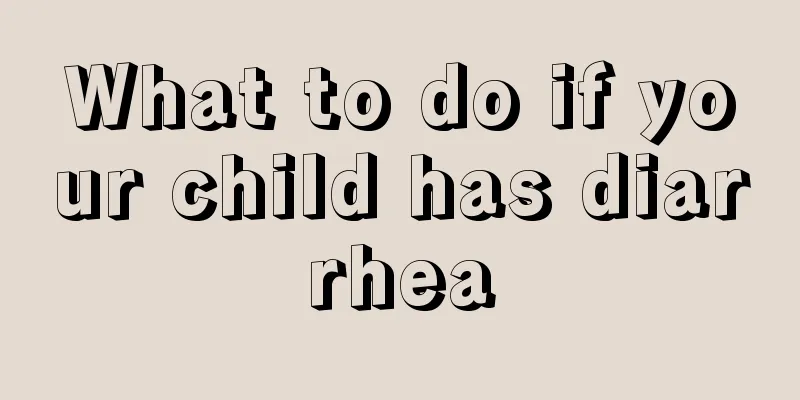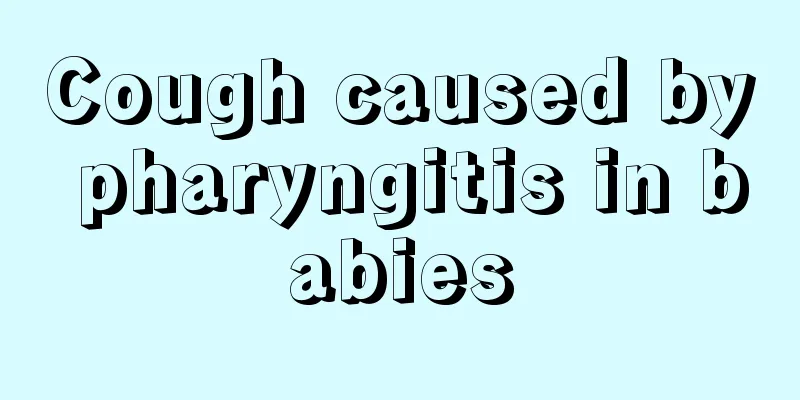What to do if your child has diarrhea

|
Diarrhea is a common disease in children, but if a baby has diarrhea, parents should pay attention. Because the child is still young, remember not to give the child diarrhea drugs indiscriminately. There are many reasons why babies have diarrhea. If the child is breastfeeding, it may be that the mother has eaten something that causes diarrhea, or the child may have caught a cold. Therefore, we must find the cause of children's diarrhea and prescribe the right medicine. 1. Give some fresh fruit juice or mashed bananas to supplement potassium; feed freshly prepared foods that are well cooked, ground or mashed; encourage the child to eat at least 6 times a day; continue to feed the child the above foods after the diarrhea stops; and add meals at least once a day within two weeks after the diarrhea stops until the weight returns to normal. 2. Drug treatment If a child's diarrhea does not improve after 3 days or if the following symptoms occur, take the child to see a doctor: ① Frequent watery stools. ② Frequent vomiting. ③Obviously thirsty. ④ Unable to eat normally. ⑤Fever. ⑥ Blood in the stool. 3. Treatment remedies When children have diarrhea, if they are given carrot puree in several doses while taking medication, it will help them recover. Take an appropriate amount of fresh carrots, wash and chop them, add water and cook them until they are soft, then take out the carrots and mash them into a paste (keep the water from boiling the carrots for later use). When eating, add 5 to 10 grams (about one teaspoon) of carrot puree to every 100 ml of water used to boil carrots. The amount of food intake mainly depends on the child's appetite, and can be fed according to the usual amount. Generally speaking, children's stools will become formed after feeding them carrot puree for 2 to 3 days. 4. Home care Replenish water in time to prevent and correct dehydration: Especially for children with acute watery diarrhea, parents should feed them more fluids to prevent dehydration. Since the harm of diarrhea is caused by the loss of a large amount of water and electrolytes, it is necessary to replenish water and electrolytes in time. Parents can feed their children a variety of convenient, acceptable and effective liquids, such as breast milk, milk, yogurt, rice soup, porridge, vegetable market, boiled water, etc., as well as oral rehydration salts (ORS), etc. As long as the child wants to drink, he should be fed. Directions for use: For children under 2 years old, feed 1 teaspoon every 1 to 2 minutes; older children can drink directly from the cup. If the child vomits, stop for 10 minutes and then slowly feed the child, 1 spoon every 2 to 3 minutes, until the diarrhea stops. |
<<: What are the commonly used medicines for children's fever?
>>: What should I do if my child has skin allergies?
Recommend
What is the reason for the red spots on the child's palms?
Children are very important to every family. Once...
Why are the whites of the newborn's eyes yellow?
There is a saying that goes, eyes are the windows...
The most common complications of scarlet fever
If scarlet fever is not treated properly, it is e...
How to take a child's temperature
There are many ways to take a child's tempera...
How tall is a baby at 3 months old?
The health of babies is very important. Their dev...
What should I do if my three-month-old baby has a cough? Simple and effective method
A baby's cough can make parents very worried,...
What to do if an infant has biliary atresia?
What should we do if an infant has biliary atresi...
Is it normal for a one-year-old baby to have diarrhea after having a fever?
Every baby will encounter many diseases during th...
Why are mentally retarded children born?
We all know that the country is now increasingly ...
Can childhood tics be cured?
Nowadays, many parents, due to their busy work, o...
Massage treatment for children's cough
Coughing in children is quite common. The common ...
What do children eat to make their eyes big?
For parents, it would be great if their children ...
Is it normal for a four-year-old baby to sweat while sleeping?
Sometimes babies sweat while sleeping, which make...
My child is coughing after getting the chickenpox vaccine
Coughing is a common thing nowadays, especially a...
Why does my seven-month-old baby not like to laugh?
Babies are the angels of every family. The physic...









